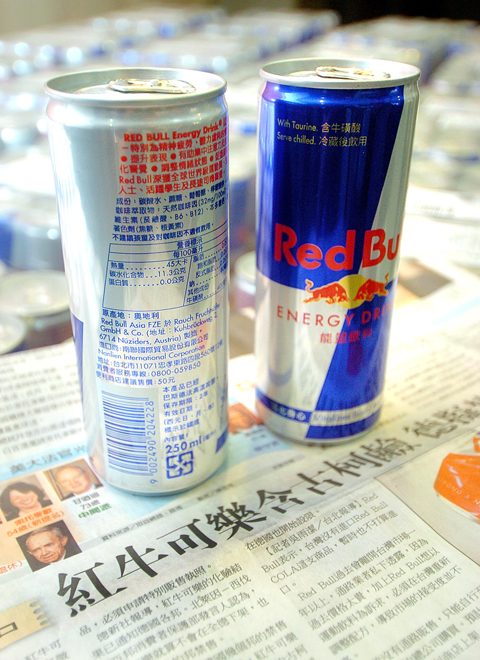Taipei prosecutors yesterday confiscated nearly 18,000 cases of Red Bull Energy Drink imported from Austria after it was found that the popular drink contained small traces of cocaine.
Taipei prosecutors and agents from the Investigation Bureau yesterday morning seized 17,165 cases of Red Bull Energy Drink — worth about NT$25 million (US$781,000) — from importer Nanlien International Co in Taoyuan and Kaohsiung. Each case contains 24 cans.
Nanlien International has imported the beverage since 2005. The energy drink contains taunne (a stimulant), caffeine and vitamins.

PHOTO: FANG PIN-CHAO, TAIPEI TIMES
The confiscated cases were part of a shipment that arrived from Austria last month. Parts of the shipment were intended for retailers and department stores, the bureau said.
Company officials said they were unaware the drinks contained cocaine.
The bureau said some of the products had already made it to market. Prosecutors ordered that the products be pulled from the shelves at convenience stores nationwide pending further investigation.
Cocaine is a Category 1 drug in Taiwan. Manufacturing, transporting and selling it is a criminal offense punishable by death or life imprisonment.
Prosecutors said they made the move yesterday after the National Bureau of Controlled Drugs on Thursday tested Red Bull Energy Drink and found traces of cocaine. The test was conducted following reports that German authorities had recently discovered that energy drinks imported by an Austrian company named Red Bull Asia FZE contained slight traces of cocaine.
Earlier last week, several German states told retailers to stop selling Red Bull Cola energy drinks after tests by the authorities in North Rhine-Westphalia state found 0.4mg per liter in the drink.
Red Bull said its cola was “harmless and marketable in both the US and Europe,” adding that similar coca leaf extracts are used worldwide as flavoring. Its own tests found no traces of cocaine, it said.

FIREPOWER: On top of the torpedoes, the military would procure Kestrel II anti-tank weapons systems to replace aging license-produced M72 LAW launchers Taiwan is to receive US-made Mark 48 torpedoes and training simulators over the next three years, following delays that hampered the navy’s operational readiness, the Ministry of National Defense’s latest budget proposal showed. The navy next year would acquire four training simulator systems for the torpedoes and take receipt of 14 torpedoes in 2027 and 10 torpedoes in 2028, the ministry said in its budget for the next fiscal year. The torpedoes would almost certainly be utilized in the navy’s two upgraded Chien Lung-class submarines and the indigenously developed Hai Kun, should the attack sub successfully reach operational status. US President Donald Trump

TPP RALLY: The clashes occurred near the Chiang Kai-shek Memorial Hall on Saturday at a rally to mark the anniversary of a raid on former TPP chairman Ko Wen-je People who clashed with police at a Taiwan People’s Party (TPP) rally in Taipei on Saturday would be referred to prosecutors for investigation, said the Ministry of the Interior, which oversees the National Police Agency. Taipei police had collected evidence of obstruction of public officials and coercion by “disorderly” demonstrators, as well as contraventions of the Assembly and Parade Act (集會遊行法), the ministry said in a statement on Sunday. It added that amid the “severe pushing and jostling” by some demonstrators, eight police officers were injured, including one who was sent to hospital after losing consciousness, allegedly due to heat stroke. The Taipei

NO LIVERPOOL TRIP: Taiwan’s Lin Yu-ting, who won a gold medal in the boxing at the Paris Olympics, was embroiled in controversy about her gender at that event Taiwanese boxer Lin Yu-ting (林郁婷) will not attend this year’s World Boxing Championships in Liverpool, England, due to a lack of response regarding her sex tests from the organizer, World Boxing. The national boxing association on Monday said that it had submitted all required tests to World Boxing, but had not received a response as of Monday, the departure day for the championships. It said the decision for Lin to skip the championships was made to protect its athletes, ensuring they would not travel to the UK without a guarantee of participation. Lin, who won a gold medal in the women’s 57kg boxing

The US has revoked Taiwan Semiconductor Manufacturing Co’s (TSMC, 台積電) authorization to freely ship essential gear to its main Chinese chipmaking base, potentially curtailing its production capabilities at that older-generation facility. American officials recently informed TSMC of their decision to end the Taiwanese chipmaker’s so-called validated end user (VEU) status for its Nanjing site. The action mirrors steps the US took to revoke VEU designations for China facilities owned by Samsung Electronics Co and SK Hynix Inc. The waivers are set to expire in about four months. “TSMC has received notification from the US Government that our VEU authorization for TSMC Nanjing